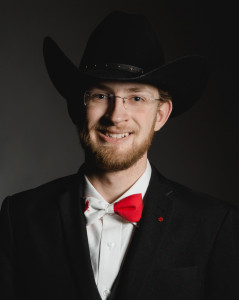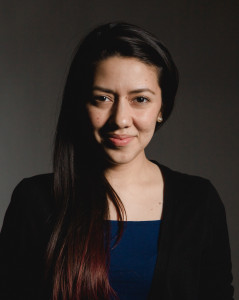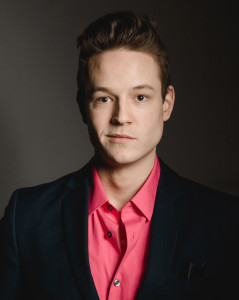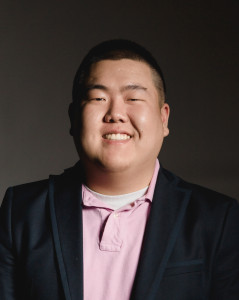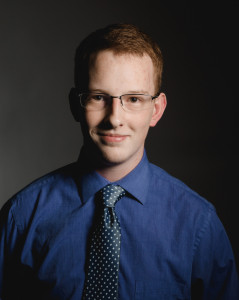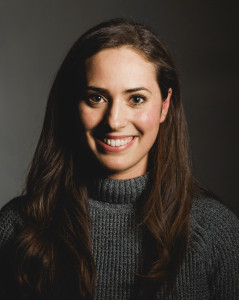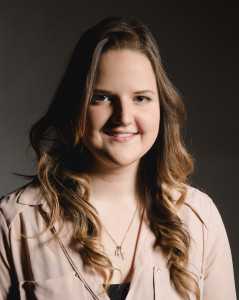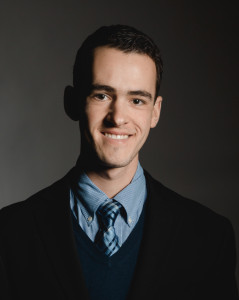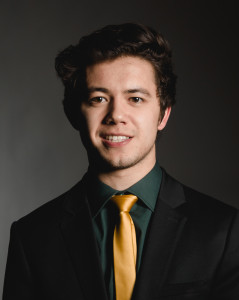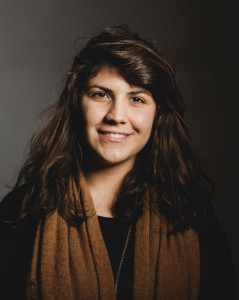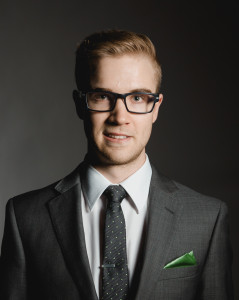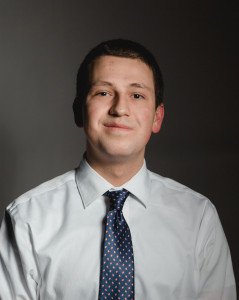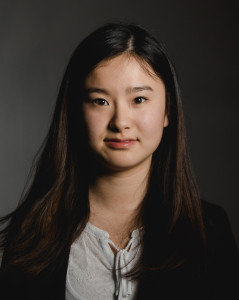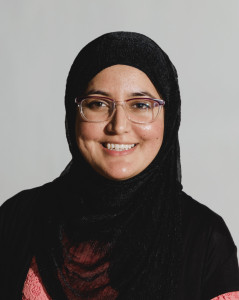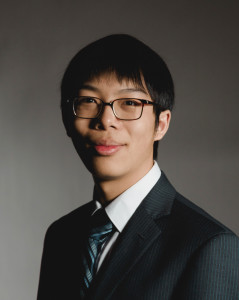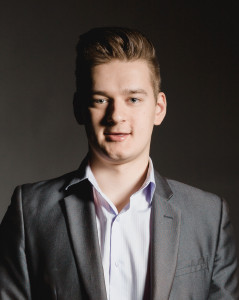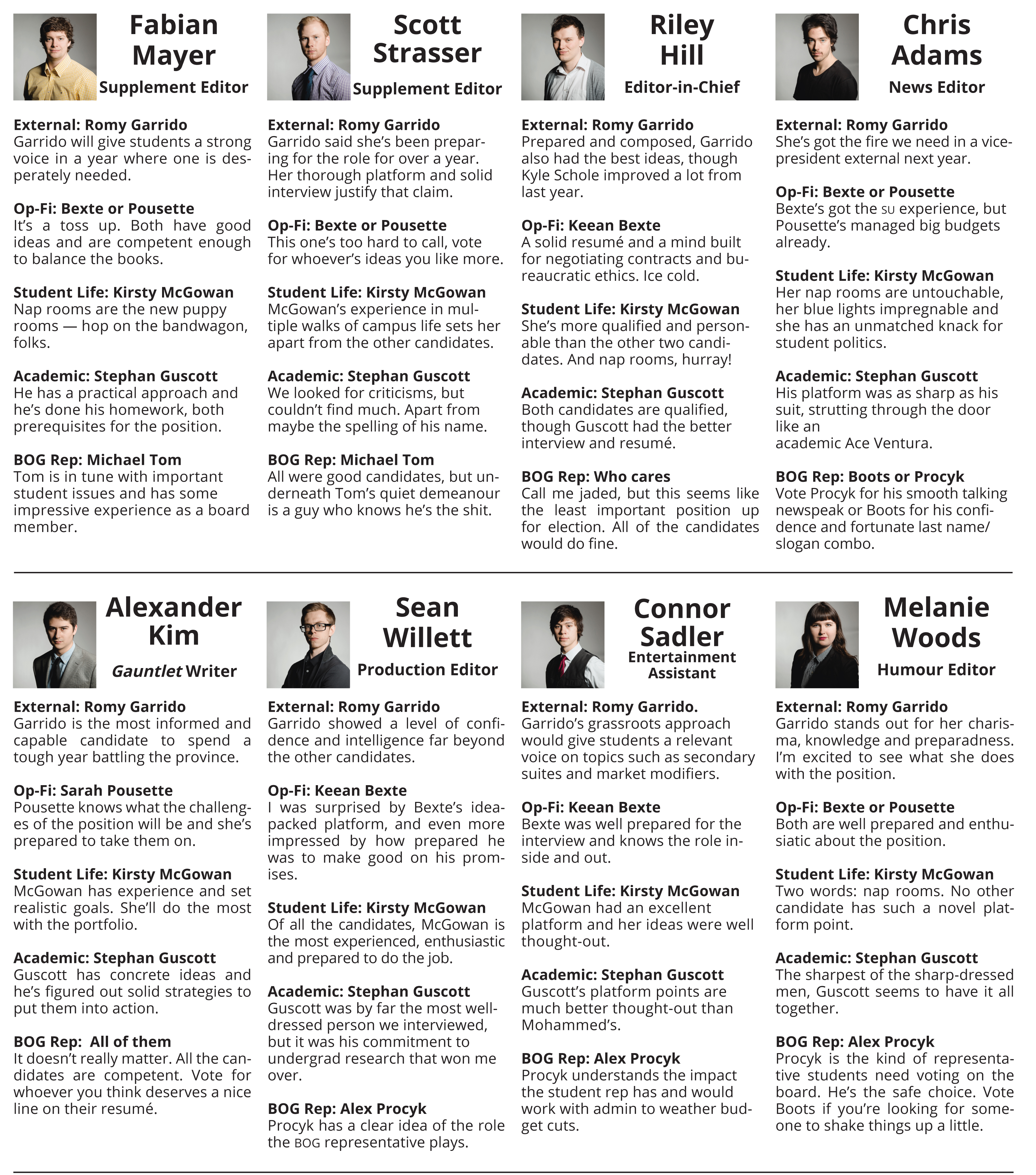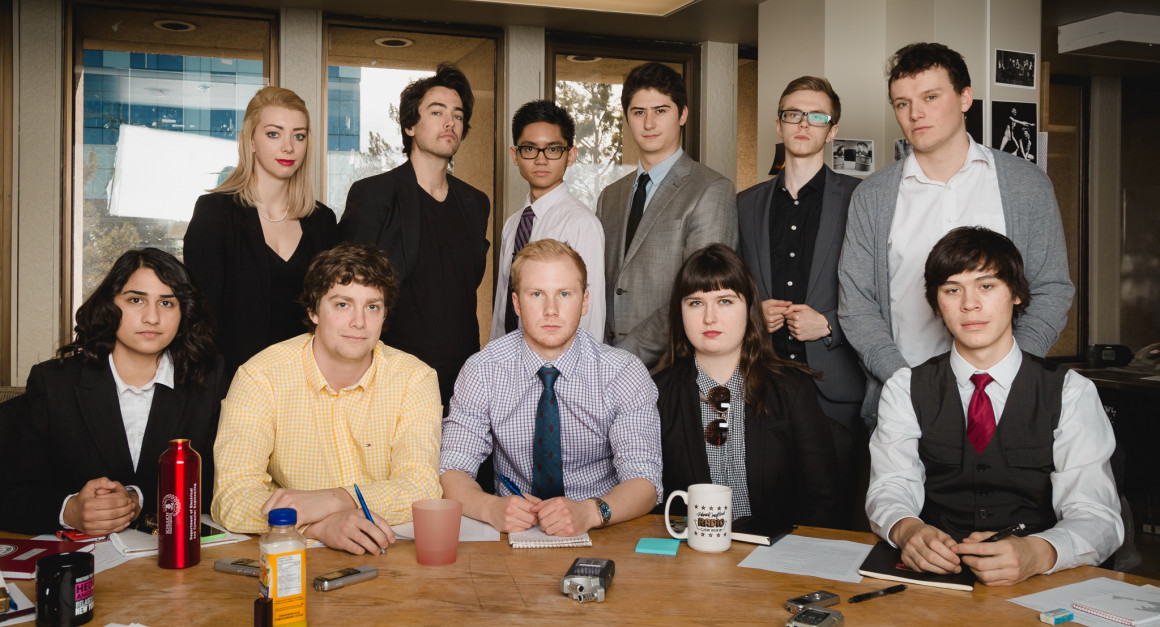
2015 Students’ Union Election Supplement
Panelists
President — External — Operations & Finance — Student Life — Academic — BoG Representative
Endorsements
[dropcap style=”normal”]E[/dropcap]very year during reading week, the Gauntlet puts together a Students’ Union election supplement to inform students on the candidates and what they hope to achieve.
We invite all the executive candidates to our office for a five-minute platform pitch and a 10-minute Q & A. Our panel of Gauntlet staff and volunteers picks apart their platforms and grills them on some of the more pressing issues they will face if elected. Some falter under the pressure, while others rise to the occasion and demonstrate their confidence and ability.
We know the election can be annoying. There will be posters smothering the walls and candidates begging for your votes. It’s easy to tune it all out. But the SU is the University of Calgary’s strongest student voice and, they have your interests at heart.
There’s no point sugar-coating it. Next year will be difficult for the SU. Provincial budget cuts are sure to impact U of C students. It’s more important than ever to elect capable officials who will be able to deal with possible austerity measures while still advocating for students.
After checking out our reviews, look for our panel’s personal endorsements on the back page — the candidates who we feel would do the best job if elected. But don’t just take our word for it. All of the candidates’ platforms are on the SU website.
You can’t properly judge a candidate solely on a poster or 90-second classroom visit. We hope this supplement helps guide your decision on who you want your future SU leaders to be. And of course, don’t forget to vote Mar. 3–5. You can vote online through your student centre or fill out a ballot in MacHall.
Panelists
[hr gap=”15″]
President
[hr gap=”15″]
The president is the leader of the Students’ Union who maintains relations with the university administration, chairs many committees and has a vote on the Board of Governors. The president oversees the work of the SU executives and the Student Legislative Council.
Levi Nilson
Levi Nilson is acclaimed as Students’ Union president. He’s well prepared and has the right personality and resume to lead the Students’ Union in the tough year ahead.
Nilson has been involved in the SU for a couple of years. When he was an arts representative in 2013 he co-founded the Faculty of Arts Students’ Association. The organization has since become the place where wannabe SU executives and representatives are socialized into the student-government clique. A few of this year’s candidates are walking the road he paved.
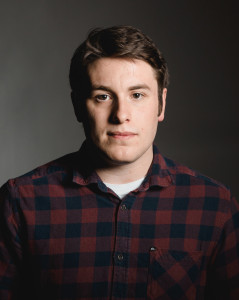
“The next year we’re basically going to be weathering budget cuts and making sure that costs aren’t passed on to students.”
He was the vice-president external this year and he’s always been one of the more vocal members of Student Legislative Council with a knack for asking uncomfortable questions.
Nilson spent his year as vice-president external in conflict with powers greater than his office. He caught an early victory last May when the Alberta government made money available for open textbooks, though he acknowledged that this had little to do with his work.
Last September, the province gave an open call to post secondaries for new market modifiers. Nilson, in his role with the Council of Alberta University Students, leaked the document to the media, taking the fight to the government and University of Calgary administration early.
He organized protests, got plenty of time in the press and found creative ways to put pressure on administration. He has also been vocal in the city-wide debate on secondary suites.
Though he fought hard on these issues, Nilson doesn’t have much to show for his efforts other than a drawer full of newspaper clippings. All three market-modifier proposals at the U of C passed and city council is still stuck in gridlock on secondary suites. Nilson said he expects some small reforms will pass soon, but the major breakthrough he fought for is unlikely.
Nilson will face greater challenges next year as president. The U of C is “probably going to see at least a five per cent cut,” as he said during his interview. A larger cut hasn’t been ruled out.
Nilson will be a wartime president, which is exactly what the SU needs. But students will judge his success at the job by what he can protect during deep spending cuts.
He will have to show that he can accomplish more as president than he did as vice-president
external.
Selected Qualifications:
- SU vice-president external, 2014–15
- SU arts representative, 2013–14
- Co-founded FASA, 2013–14
External
[hr gap=”15″]
Vice-president external is the Students’ Union representative to federal, provincial and municipal governments. The vice-president
external represents students at lobby groups, campaigns and sits on many internal committees such as Policy Development and Review.
David McDonald
David McDonald is a passionate and reasonably well-informed candidate who is aware of the big issues facing students. But he lacks the ideas and experience necessary for the high-pressure job of vice-president external.
Like most candidates for the position, market modifiers sit at the top of McDonald’s platform. He is particularly concerned with where the extra revenue from market modifiers is spent.
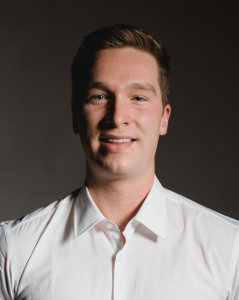
“Financial means should never be an obstacle preventing a student from pursuing their career in post-secondary.”
His platform also includes securing government funding for open textbooks, reforming provincial criteria for financial aid, pushing to legalize secondary suites and getting students to vote in this year’s federal election. All are noble causes and standard platform material.
McDonald sees the rising costs of education as the most important issue facing students. He has his priorities straight, but his ideas on how to accomplish those goals lack creativity.
Provincial budget cuts will make the next year difficult for students, the Students’ Union and the university. When asked how he would accomplish his goals, McDonald’s answers were limited to lobbying MLAs, councillors and administration.
This is standard territory for the job and hardly worth putting in a platform.
McDonald’s platform doesn’t provide a clear plan on how to deal with further tuition hikes. Tuition increases are likely next year and every candidate should have a clear position on how to fight them.
McDonald has been in the Residence Students’ Association, but he doesn’t have much experience interacting with the powerful people he will have to lobby if elected. His interview didn’t inspire confidence on this front.
McDonald wants to secure future funding for open textbooks and promote their use to faculty. Promoting their use falls under the vice-president academic’s portfolio and securing future funding would be difficult given the province’s financial situation.
He has an adequate grasp of the position and is aware of the major issues facing students. He shows a lot of promise and has the making of a strong political personality, but he’s not ready yet. Another year of observation of the SU is what McDonald needs to come out with guns blazing next year.
Selected Qualifications:
- RSA events commissioner, 2014–2015
- RSA student representative, 2013–2014
- Fourth-year political science honours student
Kyle Schole
Kyle Schole’s review last year said he had a political demeanour and the drive to succeed, but lacked the understanding needed to successfully lobby politicians. He needed another year to prepare.
He accepted the challenge, walking into this year’s interview with confidence and knowledge. He didn’t just point out key issues in the vice-president external’s portfolio, but had a working knowledge of them.
He called the consultation process for market modifiers “botched” and acknowledged that the inflation-tied tuition cap is in jeopardy. He’s also concerned that market modifiers could become a regularity when provincial funding is uncertain.
Maintaining transit fees are a large part of Schole’s platform. He’s worried that University of Calgary students will have to foot the bill when Bow Valley College joins the UPass system. UPass fee increases have generally been small so this is a relatively minor issue.
Schole wants to include students more in the Students’ Union’s advocacy strategy. He wants to make the advocacy task force (ATF) — which sits ad hoc — a permanent committee. He hopes this will create stronger advocacy efforts, although he would have a hard time getting students to participate.
He cited secondary suites and tuition costs as generational problems that need long-term solutions.
Schole regularly attends Students’ Legislative Council and claimed to be the only regular student attendee of the ATF. He clearly has the drive and dedication having followed the SU closely from the sidelines all year.
Schole could prove to be a sturdy voice during a difficult year. He hits every point he’s supposed to, but has few new solutions for tuition increases, market modifiers or provincial advocacy. He may not have the fire we’d hope for in an external candidate facing a tough term in office, but Schole is a safe and competent choice.
Selected Qualifications:
- Student Chair, Canadian International Council Calgary Branch, 2014
- Attendee of various SU committees, 2014–2015
- Arts & Science Faculty Coop & Internship Program Advisory Board, 2014
Romy Garrido
Romy Garrido’s passion and knowledge of student issues make her an excellent candidate for vice-president external.
Garrido’s main objective is ensuring market modifiers aren’t passed again. Every candidate is making this promise, but Garrido’s platform presents the most innovative strategy to make it happen.
Garrido wants to work with student clubs to host a lobbying training program. She said this would better prepare students who want to engage in provincial and federal politics. She also plans to change how the Students’ Union lobbies the provincial government. While she intends to continue traditional lobbying efforts through the Council of Alberta University Students, she also wants to reach out to local communities to start a grassroots lobbying initiative. Garrido said that by demonstrating to the public that high tuition costs are a societal problem rather than just a student issue, she can raise more support in the community. She admitted she hasn’t had much lobbying experience, but showed a thorough understanding of the process.
Garrido wants to focus on student well-being by starting an awareness campaign for secondary suite reform. She also plans to lobby the federal government for new mental-health and sexual-assault policies. Few candidates mentioned sexual-assault prevention and it’s refreshing to see a candidate recognize the issue’s importance.
Garrido’s ability to recognize the failings of traditional student lobbying strategies along with a willingness to try new ideas sets her apart from other candidates. She was also able to provide an impressive list of volunteer and executive positions she’s held during her time at the U of C.
Garrido backed up her ideas with examples from other universities and cited statistics at the drop of a hat, displaying an impressive level of knowledge. She demonstrated that she could keep cool under pressure, confidently responding to questions and criticisms of her platform with clear, well thought-out answers.
Garrido knows the ins-and-outs of this position and she has the confidence, skills and ideas to effectively fight for the best interests of U of C students.
Selected Qualifications:
- Faculty of Arts Students’ Association political science representative
- Consent Awareness and Sexual Education club vice-president external
- Canadian Political Science Students’ Association academic director National Conference 2015
Tristan Bray
Tristan Bray brings useful political experience to the table, but he didn’t communicate his platform as clearly as the other candidates for vice-president external.
Bray plans to show the government there is a high demand for open textbooks and that they save students money. Given the province’s financial situation, this would be a hard sell.
Bray didn’t know that open textbooks are already used at the University of Calgary. In a year where the vice-president external will likely spend most of their time lobbying potential tuition hikes, Bray’s focus on open textbook feels like an odd priority.
With that in mind, Bray made good points on potential fee increases. He suggested not simply fighting inevitable tuition increases, but lobbying the government to amend the policies that let market modifiers happen in the first place. Bray’s goal of applying permanent solutions to the problem showcases an understanding of how decisions made today can impact the future. But it’s nothing new, the Council of Alberta University Students has been lobbying these points for years.
Bray said he wouldn’t support market modifiers in any situation, citing the existing inflation-tied tuition cap as a way to ensure education remains affordable and accessible.
Bray had some good ideas on mental-health initiatives. He stressed working with external sponsors like the Bell Let’s Talk campaign to raise money for the Students’ Union Wellness Centre. Bray’s knowledge in this field was the highlight of his interview and platform.
Like many candidates, Bray tries to cover all the bases. Dipping into areas that aren’t within the position’s portfolio suggests he has a lot of big ideas, but isn’t clear how to make them happen.
Bray was also defensive with follow-up questions during his interview, generally not a good trait for someone who needs to lobby politicians.
There are a lot of candidates running for vice-president external. Bray’s strength is his political experience. He is knowledgeable, but risks being lost in a crowd of well prepared candidates who are a better fit for the position.
Selected Qualifications:
- University of Calgary Liberals president
- Director-at-large of a constituency association
- Risk-management chair of a U of C fraternity
Operations & Finance
[hr gap=”15″]
The vice-president operations and finance manages Students’ Union’s finances and interacts with university administration regarding capital planning and development. The position also chairs the operations and finance committee.
Dan Jo
Dan Jo has experience balancing the books at a few organizations, but doesn’t know enough about issues facing the Students’ Union to warrant your vote.
Jo’s main platform points focus on increasing transparency in the Students’ Union and keeping student fees low. Currently, the SU only releases a brief financial statement, showing how much revenue they collect and where it’s spent. Jo wants to release an audited version of the statement, documenting where every dollar of SU money is spent. The other two candidates also plan to do this.
SU fees at the University of Calgary are among the lowest in the country and Jo wants to keep them that way. The SU hasn’t
increased their fees in years, so this seems like an unambitious goal.
When asked what he would do if students requested additional funding for certain SU programs, Jo stated that he would look at the budget and “trim the fat” from other programs to find extra resources. He was short on specifics and heavy on catchphrases.
Jo also wants to use a Quality Money grant to create a texting system between students and Campus Security. He said that in some crisis situations, students might not have a chance to call security or reach a help phone. While this idea would be easy to implement, it’s hard to imagine it making campus much safer.
While Jo knows the basics of the position and has some financial experience, he could not speak in depth about the MacHall lease negotiations and the university’s contract with Chartwells Catering — significant issues for the position he is running for.
Above all, Jo wants to keep the ship sailing smoothly. It’s a cause worth applauding, but with few ambitious ideas and a limited knowledge of the portfolio’s pressing issues, Jo is not a strong candidate for the position.
Selected Qualifications:
- Royal Canadian Navy mess treasurer
- Royal Canadian Navy cook
- Economics student with a minor in communications
Keean Bexte
Keean Bexte is a passionate, experienced and confident candidate with a well thought-out plan to accomplish his goals.
Bexte pledged to bring debit and credit machines to Stör. He said Stör is about convenience, but the cash-only policy makes it just the opposite. By offering debit and credit, Bexte hopes to make the vendor more convenient for students, albeit costing $0.25 per transaction. Stör may undergo a six-month trial period with debit and credit machines this fall, so Bexte may not have to do much, though he claimed this was his initiative in the first place.
Bexte also wants to bring healthy vendors to MacHall. There may be a few vendors leaving next year and Bexte wants to prioritize incoming businesses that will serve healthy food. This is one of Bexte’s biggest selling points, as he was the only candidate to propose this on his platform.
He also mentioned the MacHall lease negotiations between the SU and the university. The SU gets most of its revenue from operating MacHall and the negotiations are crucial for the SU’s future. He cited the $19 million students have invested over the past 60 years as an important bargaining chip.
Bexte wants to improve campus safety by introducing a blue light system — an emergency response system used on many North American campuses. The lights’ effectiveness is unclear, but Bexte seemed knowledgeable of their benefits. However, at $5,000 per unit they’re fairly expensive. Bexte said he would fund the lights with a Quality Money grant.
Bexte’s knowledge of the issue and confident interview showed he would be a shrewd negotiator to have on the students’ side of the table.
Bexte has the experience and ability to achieve his goals. He’s a solid candidate for the position.
Selected Qualifications:
- Students’ Union science representative, 2014–15
- Sat on Operations and Finance, Quality Money and Advocacy Task Force committees
- Policy intern for the Minister of Agriculture
Sarah Pousette
Sarah Pousette has plenty of financial experience on and off campus and enough Students’ Union know-how to make her a solid candidate for the job.
Pousette hopes to sway the MacHall lease negotiations by touting the SU’s investment in the building. The SU spent millions on the building and contributed the majority of the funds for MacHall’s last re-development. Pousette wants to remind administration how important MacHall is to students and that she wouldn’t budge on retaining control over its operation.
Pousette’s negotiating tactic isn’t the most creative, but she has her head in the right place. She’s pragmatic enough to know the difference between campaign rhetoric and practical negotiations.
Transparency is everyone’s favourite campaign buzzword, but Pousette gets it right. She wants to publish audited financials, have committees produce quarterly reports and give Students’ Legislative Council gallery members the same documents the SU provides elected officials. The other two candidates also plan to make the SU’s audited financials public.
Pousette admits all of these goals would be easily accomplished. The SU already publishes SLC documents online, so it would be easy to provide hard copies as well. She said there’s no reason for the SU to keep detailed financial information hidden.
Pousette also wants to prioritize new funding for clubs. She plans to expand clubs funding by $10,000 and allocate more money for wellness and safe spaces in the budget. This includes prayer and other gender-inclusive spaces.
The first thing Pousette told us was that she didn’t want to make unrealistic promises. She used buzzwords, but was self-aware enough to back her points up with substance.
She has enough financial experience to prove her worth. She’s managed millions for the Calgary Exhibition and Stampede, worked as a Sustainability Resource Centre Assistant and is currently the vice-president operations and finance for the Faculty of Arts Students’ Association. FASA’s budget isn’t nearly as large as the SU’s, but Pousette’s capable of making the jump.
Selected Qualifications:
- 2012 project coordinator for the CalgaryExhibition and Stampede
- Vice-president Operations and Finance for FASA, 2014–15
- Programming Coordinator for Pacific Sport Northern B.C.
Student Life
[hr gap=”15″]
The vice-president student life chairs the clubs committee and is responsible for issues like active living, student engagement and mental health. They run Orientation Week, Frostbite and Bermuda Shorts Day, among other events.
Kirsty McGowan
Kirsty McGowan is a strong contender for vice-president student life. She has relevant experience, attainable goals and a solid understanding of the job.
Bringing nap rooms to the University of Calgary is McGowan’s best idea. She said a lack of sleep contributes to mental-health problems for students and that nap rooms have been successful at other universities. McGowan wants to set up a trial run in That Empty Space during Stress Less Week. If there’s enough interest, she will look for a permanent location.
McGowan wants to improve Campus Security infrastructure by installing emergency phone towers around campus. The towers are equipped with a blue light that flashes when activated and immediately dials Campus Security. McGowan plans to install the towers in “high impact” areas like the LRT station and near the residence buildings. She proposed using a Quality Money grant to install the towers, which cost $5,000 each.
These towers are common on North American campuses and McGowan says they will help prevent crime. The evidence she provided for this claim was weak though the towers would have a strong psychological benefit.
McGowan wants to bring back inter-faculty events like Faculty Wars. That might not be worthwhile since inter-faculty competition hasn’t been popular with students in the past.
She also wants to increase the SU clubs budget from $40,000 to $50,000 and introduce a junior executive training program for club executives. The program could prevent the slow death of clubs when executives leave or graduate without properly training successors. Clubs are an important part of the student experience and McGowan has good ideas to keep it that way.
A few platform holes aside, McGowan offers the full package. She’s been in the SU, involved with campus media and founded two clubs. She‘s participated in many facets of student life and is making reasonable promises she can deliver on. If you believe in her ideas, give McGowan your vote.
Selected Qualifications:
- Arts representative 2014–2015
- Founder and president of the British Club
- Chair for U of C Relay For Life
Matt Ray
Matt Ray is an intelligent candidate who would make a competent vice-president student life, though some of his ideas would be hard to implement.
Ray wants to boost student engagement, upgrade club infrastructure and improve mental health. His goals are admirable, but some of his ideas are unfeasible. That said, his priorities show he understands the role and what issues fall under the portfolio.
Ray wants to create a Harry Potter-style House Cup where faculties compete against each other for points. By attending Students’ Union events, club events and Dinos games, points would be won for your faculty. The likelihood of a House Cup being successful is low. The SU had to cancel inter-faculty events last year due to low participation.
Ray’s mental-health strategy is creative. He hopes to create peer-support programs where students could talk to trained peers about their problems. This would be a useful resource for students and the SU should
consider it regardless of who wins the election.
Ray also wants to create a space on campus where students can write anonymous
testimonials about the problems they face. This is another interesting concept that shows Ray recognizes the importance of mental health.
On clubs, however, Ray’s ideas fall flat. He wants to develop an app where students could see a calendar of club events. Ray deserves praise for contacting a developer prior to his interview, but past candidates have promised apps only to underestimate the time and cost of creating them.
Ray’s wealth of experience in the Residence Students’ Association shows he’s a viable option, though his involvement on campus seems pretty limited otherwise. He has a couple of interesting ideas on how to improve student life at the University of Calgary, but also some unfeasible ones. That said, Ray is a strong candidate for the job.
Selected Qualifications:
- RSA chairperson, 2014–2015
- RSA student representative, 2013–2014
- Champion crowd pumper at We Day Alberta, 2014
Patrick Ma
Patrick Ma is enthusiastic and ambitious, but his puzzling platform and lack of experience leave him unprepared for the job.
Ma’s platform centres on three slogans: know your campus, know your city and know yourself. He said he wants to give students the opportunity to experience all that the university and the city have to offer“Know your campus” focuses on student engagement. Ma’s plans include creating a calendar for club events, a club matchmaker app and promoting inter-university events, such as Dinos games. All of these ideas have been tried and failed in the past five years.
Ma said he wants to increase attendance at events like Pack the Jack and Kickoff. Ma’s priorities are confusing considering how popular these events already are. If improving school spirit is his goal, it would be better for him to promote lesser known events.
His second platform point is to “know your city.” Ma wants to bring local publications to MacHall so students can see what is going on in the city. Considering many local publications are already available on campus and that the Gauntlet promotes local events too, this seems like another unnecessary initiative.
Ma also plans to increase connections between alumni and students. He said he has reached out to the alumni association, who expressed interest in engaging with students. Networking with alumni would help students gain valuable connections related to their career paths. This is Ma’s most creative idea and he is the only candidate to stress the importance of networking in his platform.
Ma’s last goal, “know yourself,” aims to combat the stigma surrounding mental illness on campus. It consists of two initiatives: creating more events for mental-health awareness and securing alternative funding for the Students’ Union Wellness Centre. He offered few specifics on either the events or how funding would be secured and almost nobody shows up to the mental-health events already in place.
Ma is enthusiastic, but his resume is thin, his ideas need work and his communication skills are not strong enough for the student-life portfolio.
Selected Qualifications:
- Mental-health research assistant
- TD Chinatown street festival coordinator
- Supervisor at Village Ice Cream
Academic
[hr gap=”15″]
The vice-president academic is responsible for all relevant academic matters, including liaising with faculty
representatives, promoting undergraduate research and increasing the quality of education and teaching.
Sherin Mohammed
Sherin Mohammed is the current Students’ Union education representative, a logical training ground for the vice-president academic position. The majority of Mohammed’s platform points are well thought-out and attainable.
Her platform focuses mainly on the accessibility and quality of student support services, as well as enhancing the quality of education.
Her strongest point is an increased focus on the student ombuds office, since most students don’t use it or know what it is.
Mohammed wants to ensure professors tell students about it and gather feedback from students who use the office to better report its benefits. It’s nice to see Mohammed acknowledge the ombuds office’s importance and promote it as a useful student resource. She seems practical and organized in her approach to this issue.
The highest-profile issue in the vice-president academic portfolio is open textbooks. Mohammed said she will work to integrate them into the University of Calgary classrooms. She plans to lobby administration and encourage professors to use them. Mohammed has methodical strategies for working with faculty to integrate them more fully.
Her most questionable campaign point is her plan for an app that will show open and available study spaces on campus. In concept, the app sounds fantastic. But like countless past candidates, Mohammed underestimates the time and money required for such projects. The history of apps on campus suggests this is an empty promise.
Overall, Mohammed is a good candidate. She’s aware of issues already under the position’s portfolio. She also has considerable committee experience. Her plans for the ombuds office, more study-skills workshops and goal of increasing research funding are all noteworthy. They’re also realistic, considering the vice-president academic’s scope.
The study space app is a pipe dream. Thankfully, her campaign doesn’t hinge on it and her other goals are solid and attainable.
Selected Qualifications:
- SU education representative 2014–2015
- Get Out The Vote Club president 2014–2015
- Member of SU clubs, and operations and finance committees
Stephan Guscott
Stephan Guscott came into the interview like a seasoned professional. He has a capable grasp of the position, with realistic goals and clear means to achieve them. He was also well spoken and, for the most part, confident during his interview.
Guscott’s platform rests on four goals: continuing Hana Kadri’s current initiatives, working on an undergraduate research office, getting faculty to adopt open textbooks and reviewing the university’s final exam deferral policy.
According to Guscott, 27 per cent of graduates wish they had been able to gain more research experience during their degrees, which is why it’s a primary focus of his platform.
Guscott said that he has met with Kadri on several occasions to discuss his objectives. The vice-president academic often has difficulty getting things done and it’s important that he’s laid the groundwork for some of his platform points.
When faculty publish research in a journal or textbook, it’s considered scholarly activity. Contributing to open textbooks doesn’t, something Guscott would like to change. He also wants to change the faculty tenure promotions guidelines to encourage professors to develop accessible, quality textbooks. These ideas benefit both students and faculty and would help push open textbooks to the next level.
Guscott wants to relax the final exam deferral policy. The policy was temporarily relaxed last April and Guscott believes students should be trusted with not having to provide a doctor’s note. While noble, this would make it easier for students to abuse the policy.
Guscott has researched his causes and has already taken steps to accomplish his goals. In addition to being this year’s kinesiology representative, he also has a lot of Students’ Union committee experience. Guscott is a great candidate by every measure.
Selected Qualifications:
- SU kinesiology representative 2014–2015
- Member of SU teaching excellence awards,
operations and finance, and policy development and review committees
BoG Representative
[hr gap=”15″]
The Board of Governors manages the operations of the U of C. The student-at-large
representative attends BOG meetings and voices student concerns.
Alex Procyk
Alex Procyk has a grounded view of what the position entails and he has ideas for how to make his one vote on the Board of Governors matter.
Procyk plans on advocating for greater fiscal responsibility by encouraging better long-term planning and by voting against questionable spending decisions. He vowed to vote against any tuition raises, unless properly justified.
Of course, these platform points would be meaningless if Procyk didn’t know how to work with the other members of the board. Procyk recognizes that students only have two votes on the board and put forth several ideas on how to win other board members over to the students’ side.
Procyk wants to maintain a positive relationship between students and administration. While this sounds nice on paper, promising to build bridges over traditionally impassible water hasn’t succeeded in the past.
Procyk wants to unite the University of Calgary’s faculties to provide a stronger voice on the board. He pointed out that students and faculties often share common goals and using the voice of the General Faculties Council to advocate for student issues would help students have a greater impact.
Procyk was collected and articulate during his interview, though he tended to use bureaucratic and long-winded language.
This would be a criticism if Procyk were running for any other position. But it’s needed for a job that requires the ability to keep up with the bureaucratic language used by administrators.
By demonstrating that he has a realistic view of the limitations of the position, and plans to work within these, Procyk showed us that he would be a reliable fit for student representative.
Selected Qualifications:
- Get Out The Vote Club communications director
- Constituency association vice-president Calgary-Varsity
Amy Li
Amy Li knows the ins-and-outs of the Students’ Union, having already spent a year working with the SU as a science representative. Her campus experience, realistic platform and confident interview make her a sensible choice for the position.
Li’s main focus is on the affordability and quality of education. If elected, she plans to vote against tuition increases, market modifiers and mandatory non-instructional fees. She also endorses the creation of more scholarships.
As for quality of education, Li says she would use her vote to support programs that emphasize hands-on learning and research.
Li’s second platform point is enhancing the student experience. She wants to endorse initiatives that promote student wellness. Her advocacy for mental health in recent years proves she’s capable of achieving this. Li is the president and founder of the Distress Centre on Campus and she co-founded Outrun the Stigma, a charity run that advocates mental-health awareness.
Li’s third platform focus is to increase the transparency of the board’s student representative. Through social media, she wants to interact with students and bring their feedback to board meetings. Li wants students to understand the roles and responsibilities of the position but she’ll have a tough time convincing students to care.
Li’s SU experience and previous achievements surrounding her platform points make her a strong candidate.
Selected Qualifications:
- SU faculty of science representative 2014–2015
- Founder and president of the Distress Centre on Campus club
Annie Mushtaq
Annie Mushtaq’s platform focuses on consulting with students and voicing their concerns at Board of Governor’s meetings. It’s important that students are heard at the board, but Mushtaq had few ideas that went beyond the basics of the job.
Mushtaq wants to consult with students face-to-face and through social media. Taking various approaches to consultation will help her reach students.
Mushtaq recognized that her one vote on the board isn’t likely to swing votes one way or the other, showing she has a decent understanding of the position.
But with looming provincial budget cuts and tuition increases, simply bringing the student perspective to the board won’t be enough.
Unlike other candidates Mushtaq didn’t have a plan to sway other board members to the students’ side.
Mushtaq thinks past relationships between the BOG rep and administration has been too confrontational. She argues that students and administration share the goal of making a better university. Unfortunately, as we saw this year with market modifiers, students and administration often have different priorities.
Mushtaq said she would have voted no on the market modifier proposals but thinks the inflation-tied tuition increase makes sense.
She has relevant experience volunteering with the Students’ Union and being part of non-profits, but she does not have strong ideas on how to use her position to make an impact on the board.
Selected Qualifications:
- SU volunteer and member of the SU Committee of 10,000
- Former employee of Education Matters
Michael Tom
Michael Tom’s interview showed that he thoroughly researched the position and has the know-how to achieve his goals. His experience in provincial politics, the Residence Students’ Association and a handful of non-profits also make him a great choice.
Tom said he crafted his platform based on social media and face-to-face consultation with students.
Tom said he would vote against all tuition hikes, including market modifiers, mandatory non-instructional fees and the inflation-tied tuition increase. He plans to combat these hikes by building relationships with other board members and convincing them to vote with students.
As for his other goals, Tom plans to improve campus Wi-Fi and upgrade the university’s worst classrooms.
Tom didn’t make outlandish promises. He justified his initiatives with facts and statistics and presented a clear plan of action. He also had a working knowledge of the role’s code of conduct, further highlighting his preparation.
Tom wouldn’t need to be student rep to achieve some of his objectives, but he defended his candidacy well, claiming the position would give him a stronger voice and better access to the people who could help him achieve his goals.
There are a lot of candidates for board rep, but Tom manages to stand out. His quiet confidence and varied resumé make him a front-runner in this year’s most contested category.
Selected Qualifications:
- Acting president Crohn’s and Colitis Canada, Calgary Society
- SU review board member 2013–2015
Nick Boots
Nick Boots came across as a confident and reliable candidate, though not the strongest for the position.
He wants to focus on maintaining the cost of tuition. In the face of potential province-wide education cuts, that’s a pretty lofty goal, but Boots’ platform gave his plan to achieve it.
If tuition goes up next year, Boots wants to minimize the hike by convincing university
administration to look at other funding sources. He suggests the university pursue corporate investments and donations before ramping up tuition costs extensively for students. The University of Calgary already does this, but Boots wants them to do it more.
While corporate investment is one way to take the burden off students, there’s always a possibility of businesses influencing university policy. Boots shrugged this possibility off, saying any corporate influence on campus would be negligible.
Because the student representative only gets one vote on the Board of Governors, Boots wants to work closely with the Students’ Union president to try and vote together. Seeing as the student representative and the SU president have recently voted differently on some issues, this is a good approach.
Boots also wants to consult with students on a larger scale before board meetings to ensure his vote represents what students really want. To do this, he plans to use social media, posters, face-to-face communication and informal SU referendums on certain political issues.
No matter what questions were thrown at him, Boots gave confident, well thought-out answers. His objectives may be ambitious, but he has a reasonable plan to try and make them work.
Selected Qualifications:
- University of Calgary Campus Conservative Association vice-president finance
- Fourth-year finance major
Endorsements
[hr gap=”15″]


